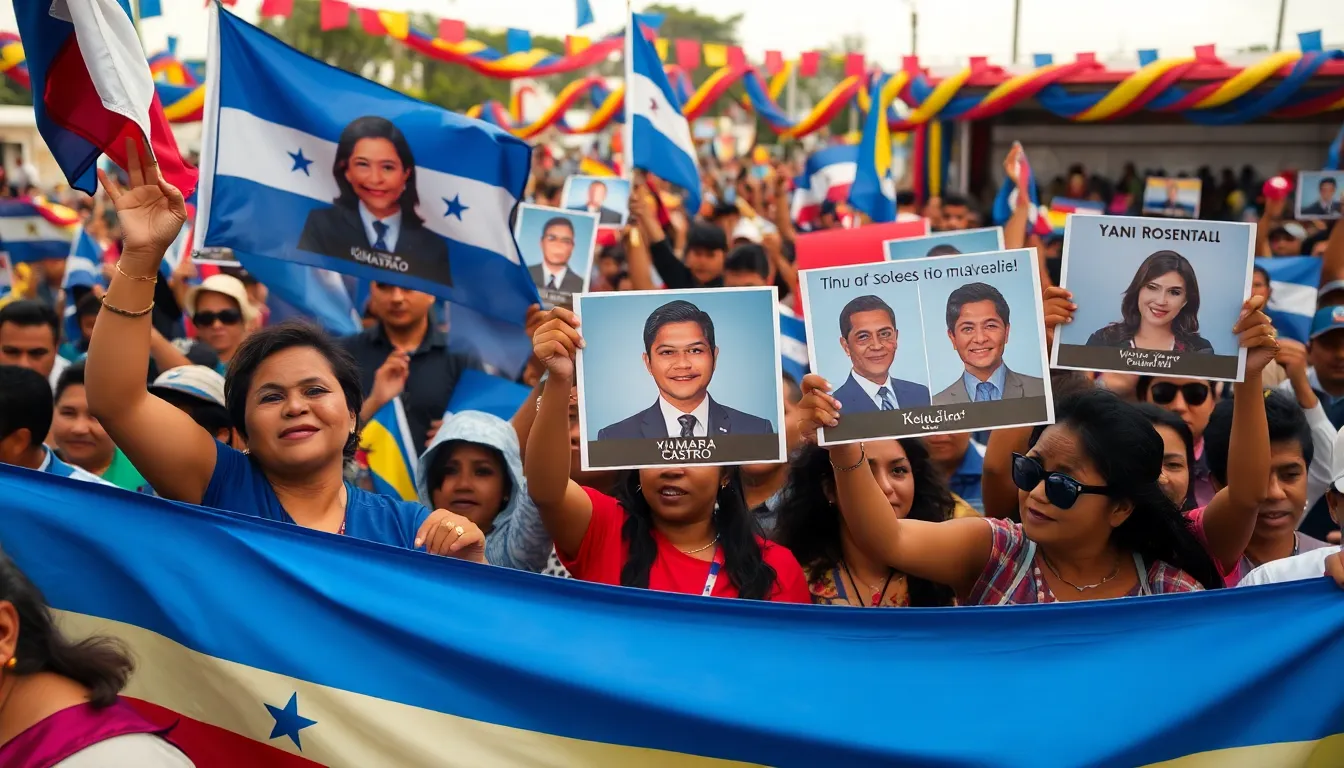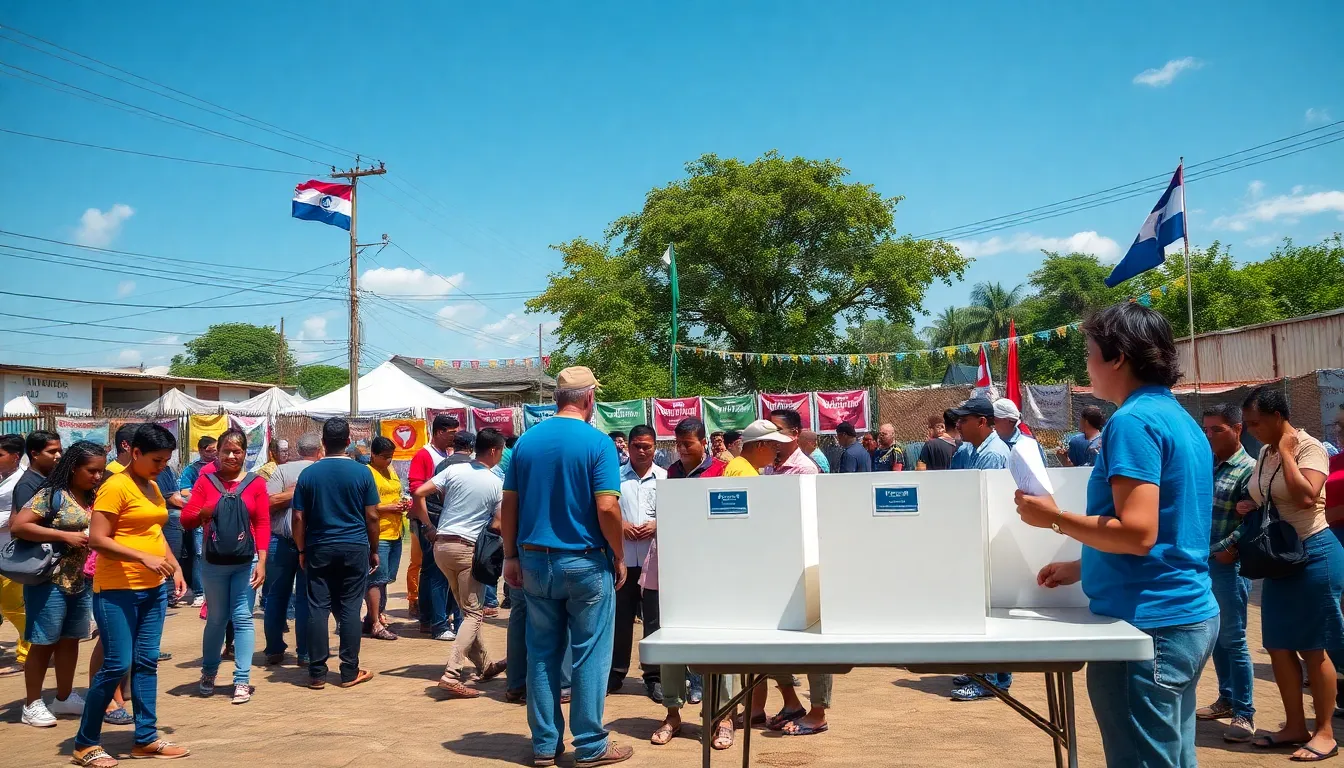As the political drama unfolds in Honduras, the question on everyone’s lips is: who’s winning the elections? With candidates jostling for position like kids on a playground, the stakes are higher than a cat on a hot tin roof. Voters are buzzing with excitement, and the atmosphere is electric as the nation gears up for a pivotal moment in its history.
Table of Contents
ToggleCurrent Electoral Landscape in Honduras
The political atmosphere in Honduras remains charged, marked by intense competition among candidates. Voter engagement signals the importance of this moment in the country’s electoral history.
Key Political Parties
Several key political parties shape the current landscape. The National Party consistently maintains a strong foothold, while the Liberty and Refoundation party attracts significant grassroots support. Another influential player is the Liberal Party, which historically has had a major impact on Honduran politics. Each party presents distinct platforms on issues pertaining to economic growth, security, and social reforms. Candidates from these parties work diligently to win voter trust and influence electoral outcomes.
Voting Trends and Statistics
Voting trends reveal a dynamic electorate. Approximately 60% of registered voters participated in the last election, reflecting high civic engagement. Young voters, aged 18 to 30, account for around 25% of total voters, indicating a growing influence of this demographic. Gender representation has also evolved, with nearly 50% of voters identifying as female in recent elections. Such statistics suggest a shift toward inclusivity, fostering diverse perspectives in the electoral process.
Major Candidates and Their Campaigns

The electoral landscape in Honduras features several key candidates, each representing different visions for the country’s future.
Candidate Profiles
Xiomara Castro stands as the presidential candidate for the Liberty and Refoundation party. Her platform emphasizes social justice and economic equality. Nasry Asfura, representing the National Party, promotes a focus on security and infrastructure development. Yani Rosenthal of the Liberal Party advocates for economic reform and investment. Each candidate’s unique background influences their approach, appealing to various voter demographics and addressing specific local concerns.
Campaign Strategies and Promises
Focusing on grassroots mobilization, Xiomara Castro engages with communities directly. She aims to connect with young voters, leveraging social media to amplify her message. Nasry Asfura emphasizes improved public safety through comprehensive reforms in law enforcement. His campaign includes promises for infrastructure upgrades to spur economic growth. Yani Rosenthal concentrates on attracting foreign investments, promising job creation and stability. Strategies employed by these candidates reflect the diverse priorities of the electorate, tapping into the hopes and concerns of the Honduran people.
Public Opinion and Polling Data
Current polling data reflects the high stakes of the ongoing elections in Honduras. Voter engagement remains robust, influencing outcomes significantly.
Recent Poll Results
Recent surveys indicate a tight race among the leading candidates. As of now, Xiomara Castro garners approximately 30% of voter support, followed closely by Nasry Asfura at 28%. Yani Rosenthal trails slightly, with 22% of respondents favoring him. The remaining percentage consists of undecided voters, who could sway the election in the coming weeks. Polls conducted in early October reflect the competitive nature of this election, highlighting an evolving political dynamic shaped by public discourse and candidate interactions.
Voter Sentiment Analysis
Voter sentiment demonstrates the electorate’s diverse priorities. A significant portion of voters expresses concern about economic stability and security. Young voters, aged 18 to 30, particularly resonate with campaigns emphasizing social justice and equal opportunities. Nearly 40% of respondents cite social issues as their primary concern, indicating the impact of longstanding inequalities. Gender inclusivity also plays a crucial role, with female voters showcasing distinct preferences for candidates advocating for their rights. Overall, sentiment reveals a society eager for change, with the potential to reshape Honduras’ political landscape.
Influence of Social Media and News Coverage
The ongoing elections in Honduras are heavily influenced by media coverage and social media engagement. Candidates utilize various media campaigns to communicate their platforms effectively.
Media Campaigns
Candidates craft tailored media campaigns to resonate with voters. Xiomara Castro prioritizes direct engagement, connecting with communities through in-person events and social media updates. Nasry Asfura emphasizes law enforcement reforms and infrastructure improvements in his messaging, utilizing ads to reinforce his security focus. Yani Rosenthal promotes economic reform through targeted advertisements, striving to attract foreign investment. These distinct approaches highlight candidates’ strategies to engage an electorate that values transparency and dialogue. Polling indicates that nearly 60% of voters are aware of these campaigns, showcasing the significance of effective media outreach.
Role of Social Media in Elections
Social media plays a vital role in the electoral process in Honduras. Platforms enable candidates to reach younger voters, comprising approximately 25% of the electorate. Engaging content, such as polls and videos, encourages discussions about key political issues. Candidates like Castro create relatable content that directly addresses the aspirations of young people. Active interaction with followers fosters a sense of community and trust. Moreover, political debates trending on social media platforms shape public perception and influence voter sentiment. As elections approach, nearly 60% of young voters indicate social media significantly impacts their voting choices.
Potential Outcomes and Implications
As Honduras moves closer to the election results, various outcomes could emerge that significantly shape the nation’s future.
Short-Term Effects
Immediate effects will likely center around voter sentiment and public reaction to the election results. A close race may lead to heightened tensions, especially among supporters of the leading candidates. Should Xiomara Castro secure a victory, many may anticipate rapid implementation of social justice policies. Conversely, if Nasry Asfura prevails, a focus on security and infrastructure enhancements might dominate the agenda. Voter engagement remains crucial, with about 60% of the electorate actively involved, suggesting quick mobilization for protests or celebrations depending on the results. Young voters, who represent 25% of the electorate, might play a pivotal role in these immediate responses, particularly given their strong interest in social issues.
Long-Term Consequences
Long-term consequences will shape Honduras’ political landscape for years. Should any candidate’s policies gain traction, they might establish new norms around governance and public engagement. For instance, Xiomara Castro’s emphasis on social equality could foster a government more responsive to marginalized communities. Alternatively, Nasry Asfura’s approach could deepen investments in infrastructure, potentially stimulating economic growth. The attention that gender representation received also suggests that future elections may see more inclusive platforms. If this trend continues, nearly 50% female voter representation could alter the priorities within political parties. Overall, these outcomes, influenced by media coverage and social media engagement, could enhance the political dialogue in Honduras, ultimately leading to a more attuned society.
The ongoing elections in Honduras reflect a nation at a crossroads. With a significant portion of the electorate engaged and diverse candidates presenting their visions for the future, the stakes couldn’t be higher. Voter sentiment is a powerful force that could reshape the political landscape, especially as young and female voters increasingly voice their priorities.
As the final results approach, the potential for change looms large. Whether it’s Xiomara Castro’s commitment to social justice or Nasry Asfura’s focus on security and infrastructure, each candidate’s vision resonates with different segments of the population. The outcome of these elections will not only determine the immediate future but could also set the stage for a more inclusive and dynamic political environment in Honduras.



